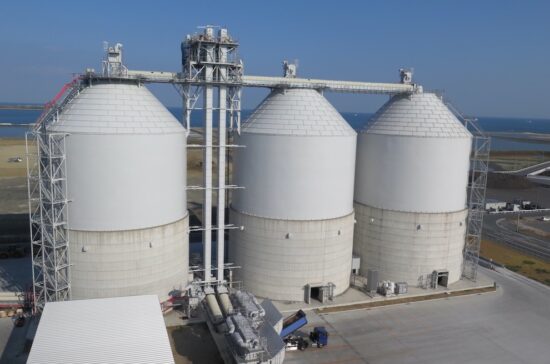The importance of Canada’s historic forest products trading partnership with Japan was magnified this fall when the Wood Pellet Association of Canada (WPAC) welcomed Japanese visitors to B.C. and then joined government, industry and First Nations partners on B.C.’s first post-Covid trade mission to Japan.
“WPAC is very impressed with how Japan has grown the domestic biomass power sector and is contributing to climate change mitigation,” says Gordon Murray, WPAC executive director. “Our members are honoured to supply Japan with high quality, sustainable Canadian wood pellets to support their climate targets.”
Renewable energy is considered indispensable to Japan’s pledged decarbonization, and as part of its goal to become carbon-neutral by 2050 the country is accelerating its use of biomass.
Over the past decade, Canadian wood pellets exports to Japan have grown tenfold from 106,000 tonnes in 2012 to 1.1 million tonnes in 2021. Exports to Japan are continuing to accelerate as Canada is on pace to reach 1.4 million tonnes by the end of 2022, a further increase of 27 per cent in just a single year. (Source: Global Trade Atlas)
In October, Takahiro Yoshida, Ph.D., with the Forestry and Forest Products Research Institute, and Hirokazu Funatasu with the Japan Woody Bioenergy Association, joined WPAC for a tour of the University of British Columbia’s Biomass and Bioenergy Research Group Laboratories.

As a member of the ISO technical committee 238, WPAC guided them on their mission to learn about Canada’s leading approach to wood pellet certification (ENplus), wood pellet standards setting, and ISO wood pellet testing using chemical, mechanical and physical testing methods. From here, they toured WPAC member pellet plants—Premium Pellet in Vanderhoof and Drax in Burns Lake – to learn firsthand about quality production and certification.
Just a few weeks later, the tour group reunited in Japan for a tour of its largest, most advanced power station Kanda Biomass Energy in Konda town, Fukuoka prefecture.
“The plant is an excellent example of a dedicated biomass plant using Canadian wood pellets in combination with palm kernel shells (PKS) from Malaysia and Indonesia and Japan’s locally produced wood chips,” says Fahimeh Yazdan Panah, WPAC’s director of research and technical development. “The typical mix is 60 per cent wood pellet, 30 per cent PKS and 10 per cent wood chips. Canadian pellets offer high durability and calorific value and low potassium and sodium.”
The new, highly efficient power plant has a capacity of 75 megawatts providing electricity to 170,000 households annually, 10 times the requirement of Kanda town. The plant consumes about 170,000 tonnes of wood pellets, 120,000 tonnes of PKS and 60,000 tonnes of wood chips per year, providing approximately 670,000 tonnes of GHG savings compared to a similarly sized coal power station.
“We are partners in each other’s success, supplying the world with high quality forest products from some of the most sustainably managed forests in the world,” Murray later told the Japan Trade Mission delegation at a gathering of key customers, trading partners, governments, industry and First Nations at the Canadian Embassy in Tokyo.
The event was kicked off with a new video celebrating the importance of sustainability sourced pellets from B.C. and honouring the trade relationship between Canada and Japan. The video, Building a Brighter Future Together, produced in English and subtitled in Japanese, can be viewed here.
At the event, B.C. Minister of Forests Katrine Conroy reinforced that Japan is a critically important export market for B.C.’s high-quality wood products, and that, through B.C.’s global leadership and innovation in sustainable forestry and mass timber manufacturing, the sector can increase exports to the country.
Organized by Forestry Innovation Investment Ltd., the Japan trade mission recognizes the importance of environmental, social and governance performance as businesses look to succeed long term in a fast-changing marketplace where organizations are making purchasing decisions that factor in impacts to the environment and communities around the world.
“Our members were proud to pay respect to the important relationship between our two nations, and our shared commitment to making the world a better place today and for future generations,” Murray says.
This article was originally published by Canadian Biomass, a national media brand providing coverage of the emerging biomass, bioenergy and bio-products markets. See CanadianBiomassMagazine.ca for more information.

